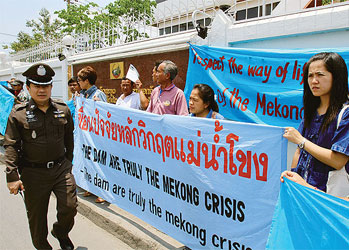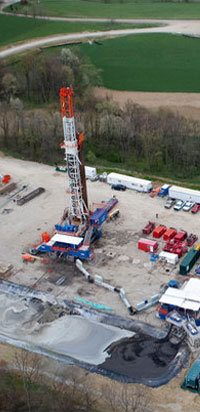 In the United States, dam enthusiasm is on the wane as people have seen hydro power devastate river ecosystems. But in the developing world, dam building is booming.
In the United States, dam enthusiasm is on the wane as people have seen hydro power devastate river ecosystems. But in the developing world, dam building is booming.
Where dam proposals go -- Ethiopia, Uganda, Chile -- controversy follows. Often this power is built for richer neighbors: dams slated for Guyana, Bolivia, and Peru would supply Brazil; dams in Laos would power China. This week construction was halted on the controversial Xayaburi Dam on the Mekong River in Southeast Asia. But that's not the end of the story.
 Much dam construction in South America now is being financed within the region, especially by energy-hungry Brazil. While Peru's energy needs are increasing, the electricity from many of the dams proposed for its Amazonian rivers would be sold to Brazil.
Much dam construction in South America now is being financed within the region, especially by energy-hungry Brazil. While Peru's energy needs are increasing, the electricity from many of the dams proposed for its Amazonian rivers would be sold to Brazil.Remember: Hydroelectricity is not as green as its proponents paint it. Especially in tropical lowlands, methane from decaying vegetation and carbon emissions from deforestation can cancel out the benefits of hydro power. Cost-benefit calculations also tend to underestimate or ignore damage to ecosystems, displacement of people, and disruption of traditional economic activities, such as fishing. Plus, roads built to serve dam projects attract settlers who clear the forest for farming or other activities. Satellite photos clearly show the steady deforestation along roads through the Amazon. Furthermore, scientific models indicate that both climate change and deforestation are likely to affect tropical rainfall, which could negatively impact dams' electricity production capacity.
I've got my eye on: Indigenous peoples. They are becoming more outspoken, demanding that South American governments comply with international treaties that require them to be consulted about development projects that could affect their territory, cultures, and livelihoods.
Click for more stories of interest from this contributor...
 There is a vast gulf between those who make dam policy, such as the World Bank and the Thai/Lao political and financial class -- and the lives of the rural poor who depend almost 100 percent on the ecosystem for sustenance. To make matters worse, in Asia, the power is often not needed. Dams are being pushed by the stock market and banks and, in the case of Sino Hydro, China's leadership, which owns majority shares in the company. A writer for Inter Press Service had it all wrong when he uncritically supported the poverty alleviation myth. It's been proven again and again that dams increase rural poverty while increasing urban wealth. Renewables such as solar and microhydro could meet most villagers' needs for electricity.
There is a vast gulf between those who make dam policy, such as the World Bank and the Thai/Lao political and financial class -- and the lives of the rural poor who depend almost 100 percent on the ecosystem for sustenance. To make matters worse, in Asia, the power is often not needed. Dams are being pushed by the stock market and banks and, in the case of Sino Hydro, China's leadership, which owns majority shares in the company. A writer for Inter Press Service had it all wrong when he uncritically supported the poverty alleviation myth. It's been proven again and again that dams increase rural poverty while increasing urban wealth. Renewables such as solar and microhydro could meet most villagers' needs for electricity. I'll be watching ... … to see if the Xayaburi Dam is actually stopped. But considering the work has been going on despite the Lao government saying it would call a one-month moratorium, it seems unlikely. Its going to be very interesting to see how far public protest goes in all of the Mekong nations. Communities may use this dam as a catalyst to voice discontent with regional governments.
Notable quote: I think the quote from a highly placed Lao friend said it all. "They (the various Lao ministers ) have spent the bribe money. They cannot pay it back so the dam has to go ahead."
 The Mekong River Commission (MRC) is the advisory body charged with issuing non-binding recommendations on the proposed Xayaburi Dam and acts as a forum for the four lower Mekong countries to jointly discuss concerns. On April 19, the MRC's Joint Committee was expected to issue a final (albeit non-binding) recommendation on the dam, but it decided to postpone its recommendation until the fall. On April 23, a Thai newspaper quoted the Xayaburi Dam developer as saying the project may get official approval from the Lao government within two weeks. If Laos approves the dam, environmentalists may interpret the approval as a snub of the MRC process.
The Mekong River Commission (MRC) is the advisory body charged with issuing non-binding recommendations on the proposed Xayaburi Dam and acts as a forum for the four lower Mekong countries to jointly discuss concerns. On April 19, the MRC's Joint Committee was expected to issue a final (albeit non-binding) recommendation on the dam, but it decided to postpone its recommendation until the fall. On April 23, a Thai newspaper quoted the Xayaburi Dam developer as saying the project may get official approval from the Lao government within two weeks. If Laos approves the dam, environmentalists may interpret the approval as a snub of the MRC process. I'll be watching ... … to see if Laos decides to approve the dam without waiting for the MRC's pending recommendation. If it does, it will be interesting to see how the other three lower Mekong countries -- particularly Vietnam, which has been most publicly critical of the Xayaburi proposal -- will react. A Mekong expert at the University of Sydney, Philip Hirsch, predicts there will be a "face off" between ministers from Laos and Vietnam. Stay tuned.
Quote of the week: Thailand would buy the bulk of the Xayaburi Dam's electricity. I recently spoke with a 27-year-old teacher, Mu Panmeesri, on the banks of the Mekong in Thailand. He said the Xayaburi's potential environmental and social consequences outweigh the potential economic benefits. As he put it: "We need food, not electricity. We can't eat electricity."
Click for more stories of interest from this contributor...






